Kombucha is a beverage made from fermenting green and or black tea using cultures of probiotic bacteria. It can be used to bolster your body’s gut bacteria, leading to a healthier digestive tract.
Kombucha has become incredibly popular recently, and as a result, there is a dizzying number of products on the market to choose from.
These range from healthy and high-quality health beverages to sugary drinks that you’re better off avoiding. How should you find the best kombucha?
Check out our rankings. Our research team has ranked the healthiest kombucha available today.
Research
Rankings
1. GT’s Kombucha
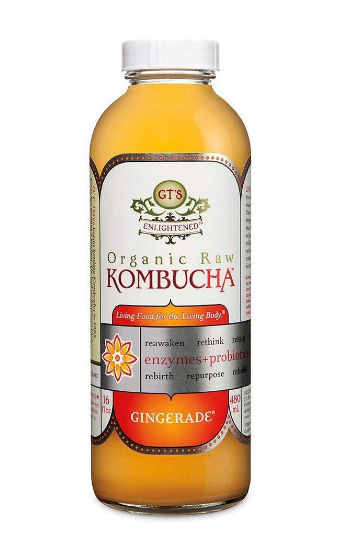
GT’s Kombucha is one of the original and most popular kombucha brands, and it stakes its products on their purity and lack of additives or sweeteners.
GT’s Kombucha products are extremely low in sugar, with only two grams per bottle of the gingerade flavor. This makes it a winner for everyone, even if you are one a ketogenic or low-carb diet, and helps it garner our top pick.
2. Remedy Kombucha
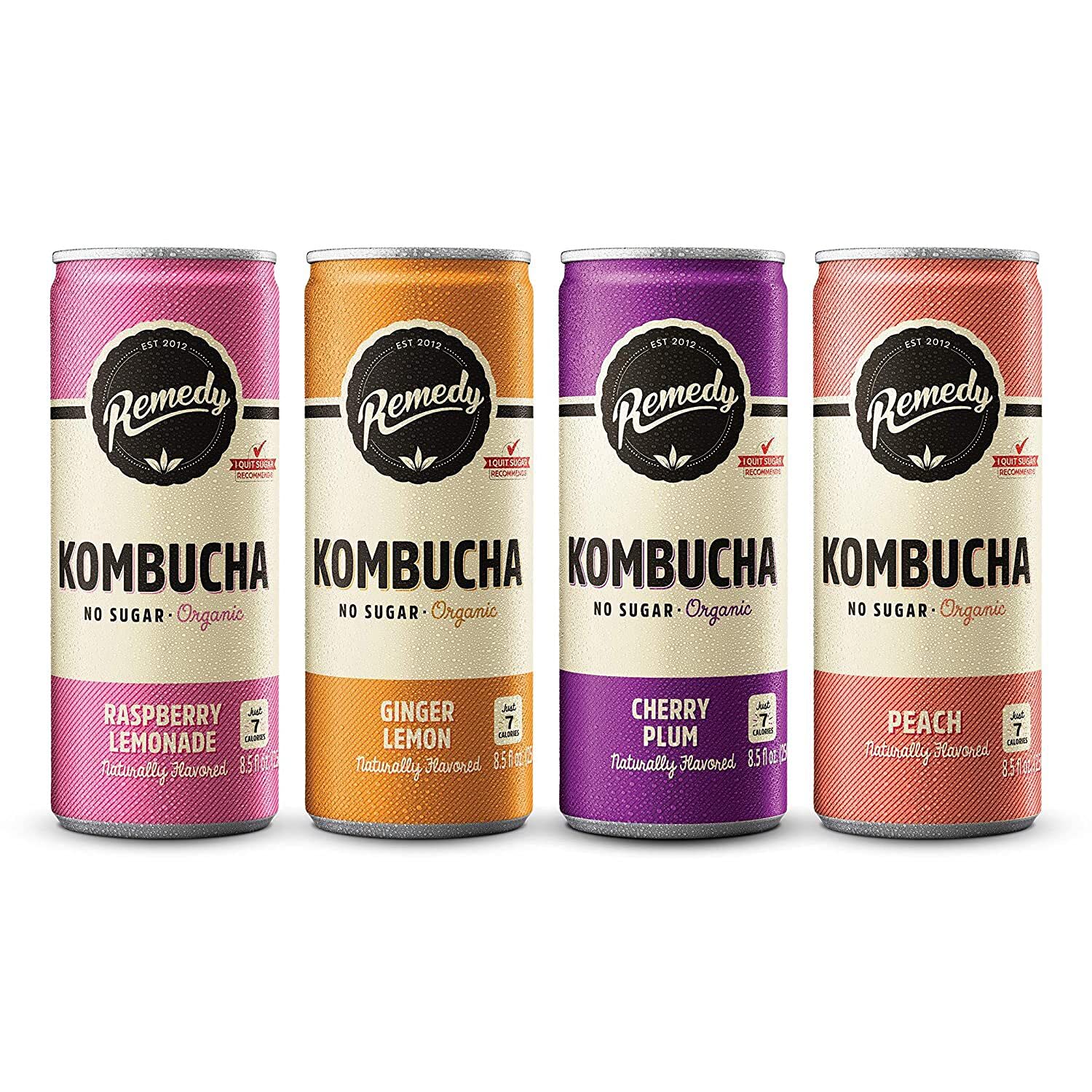
Remedy Kombucha tastes amazing, carries an organic certification, and is loaded up with probiotic yeast and bacterial cultures. It’s a great all-around choice, and it’s our favorite when it comes to canned kombucha. To top it off, it’s completely sugar-free!
3. Theory of Kombucha Powdered Mix
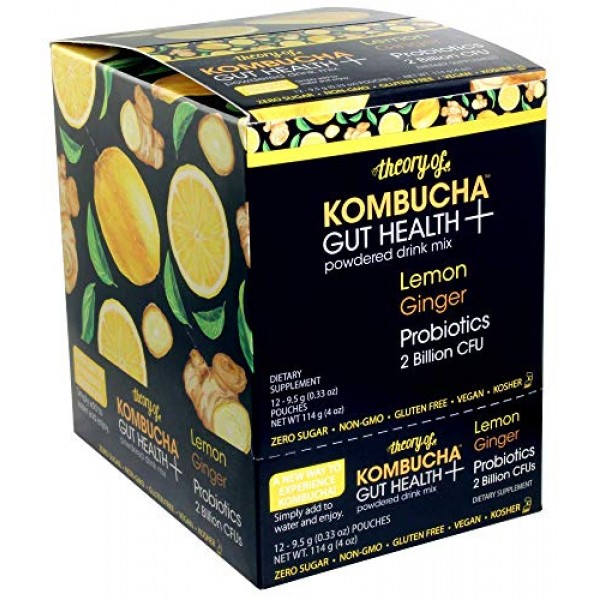
Theory of Kombucha has a clever new take on kombucha, in the form of powdered and portable drink mixes. While it can’t measure up to raw kombucha, the probiotic content is great, the sugar content is low, and the convenience is unbeatable, all of which boost Theory of Kombucha up in the rankings.
4. Humm Kombucha
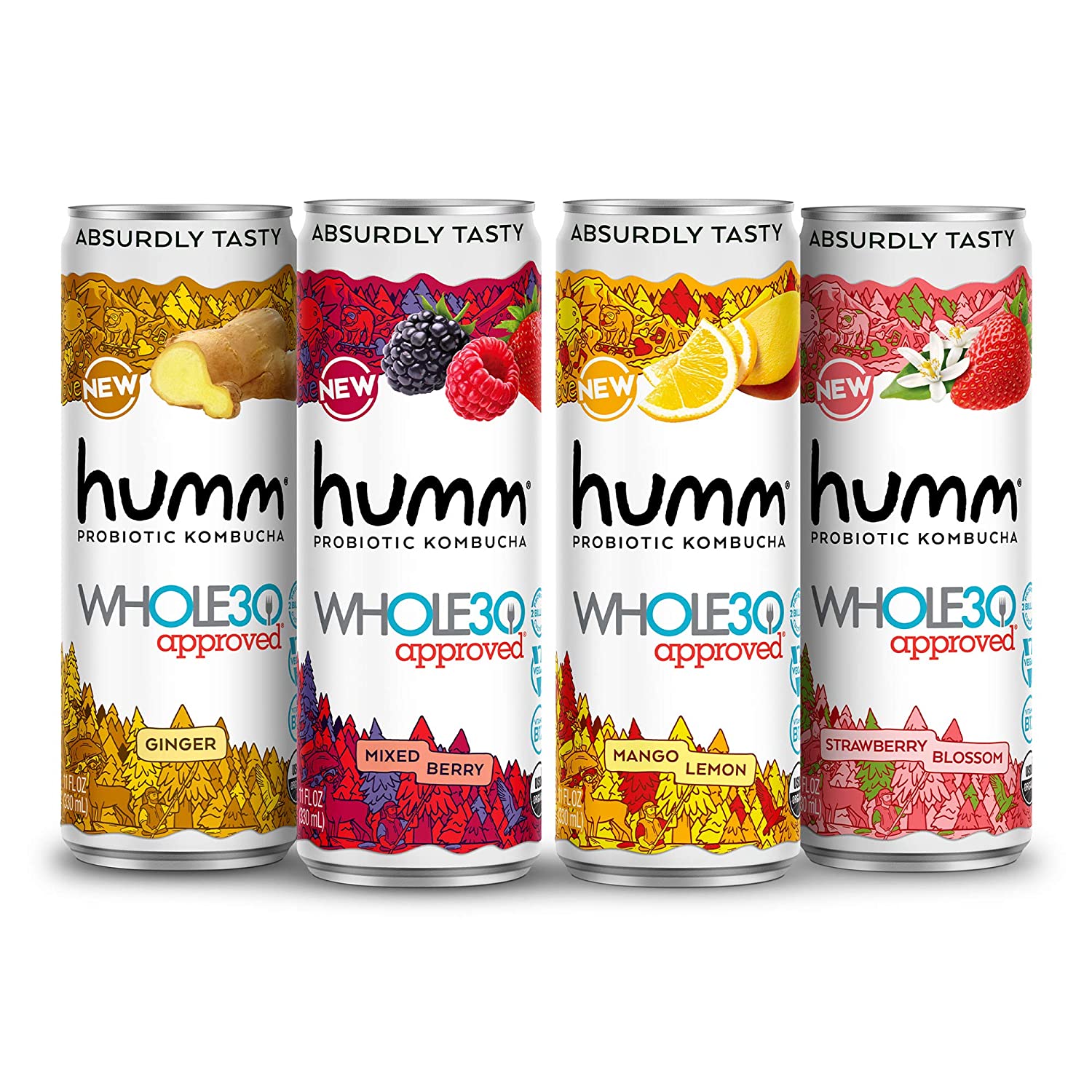
Humm Kombucha is a refreshingly simple and health-focused formulation in a world of sugary imitation products. It’s super low in sugar, containing only six grams of naturally-occurring sugar, and tastes great, making it a great choice for beginners to the world of kombucha. Many of its flavors mix in additional superfoods, like blackberries, elderberries, and ginger.
5. Latta Kombucha
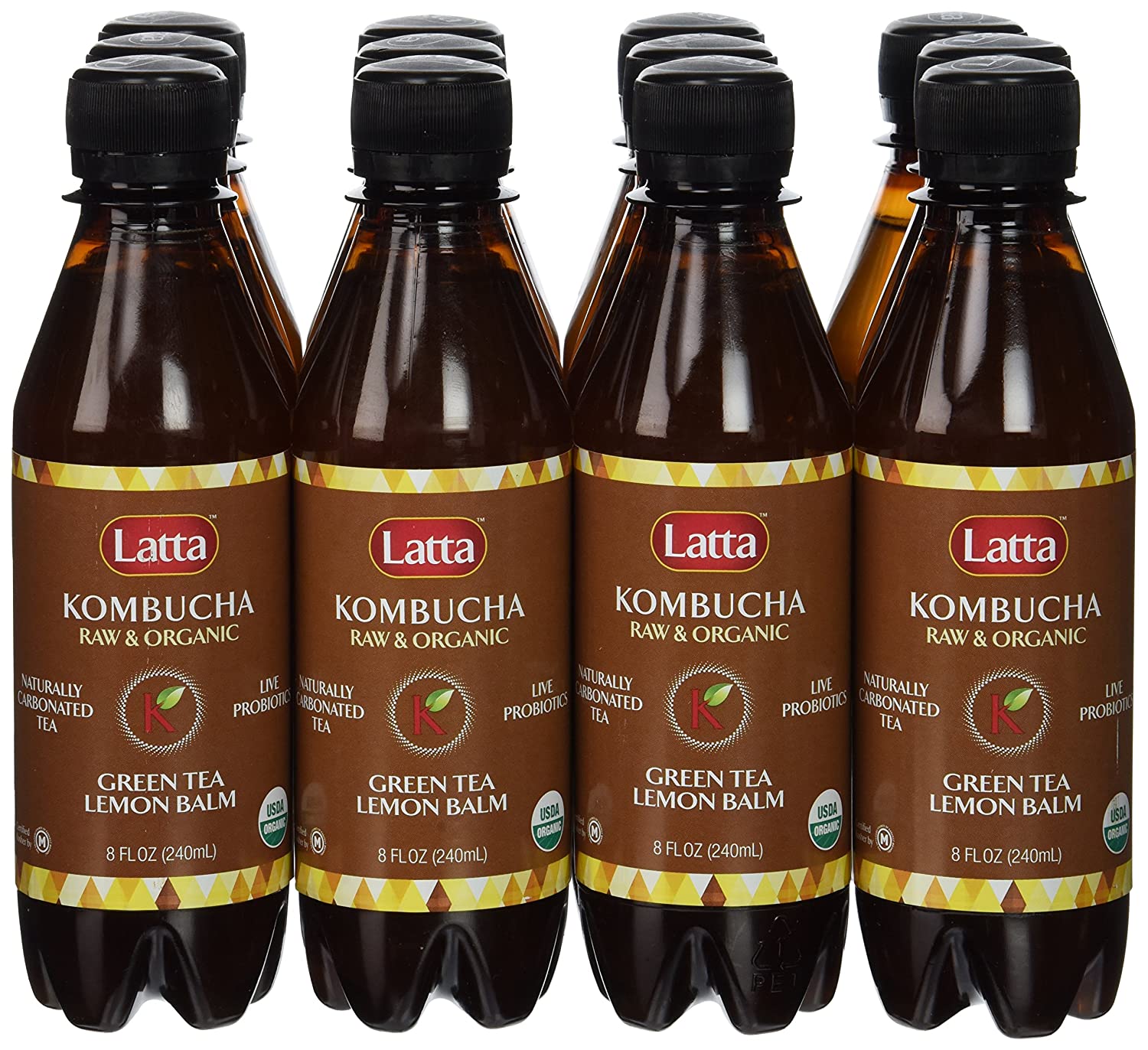
Latta Kombucha is a certified organic kombucha that’s a solid pick if you are looking for something low in sugar.
Each bottle contains only two grams of sugar, so it’s not excessively sweetened like some of its competitors.
The taste is pretty mild, so if you are hesitant about trying some of the stronger and sharper kombuchas out there, Latta Kombucha could be a good pick.
6. Health-Ade Kombucha
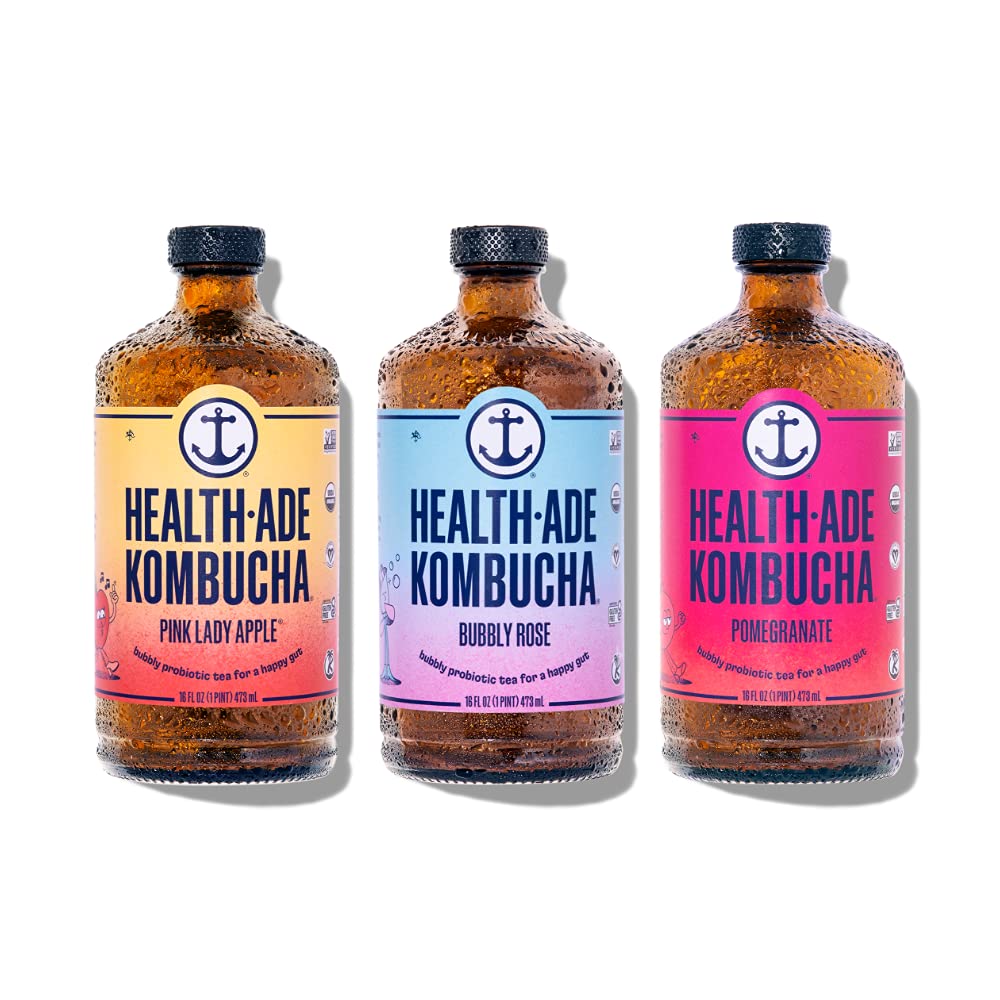
Health-Ade Kombucha comes in a classic tinted glass bottle in flavors ranging from sweet to tart. It tastes great, but the sugar content (14-16 grams per bottle) is a bit too high to make the top few places in our rankings.
7. Yogi Green Tea Kombucha
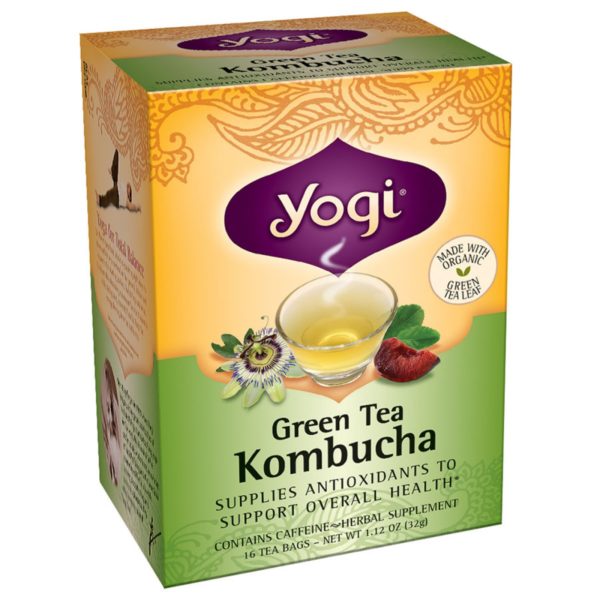
Yogi Green Tea Kombucha uses dried kombucha powder to add kombucha flavor and—hopefully—live bacteria to dry bagged green tea.
Since natural kombucha is a “living food” with cultures of live bacteria, it’s hard to know whether these bacteria survive the drying process intact, and whether they contribute anything other than flavor to the beverage.
Even though it’s popular, it may not be the best bet for health benefits.
8. Brew Dr. Raw Organic Kombucha
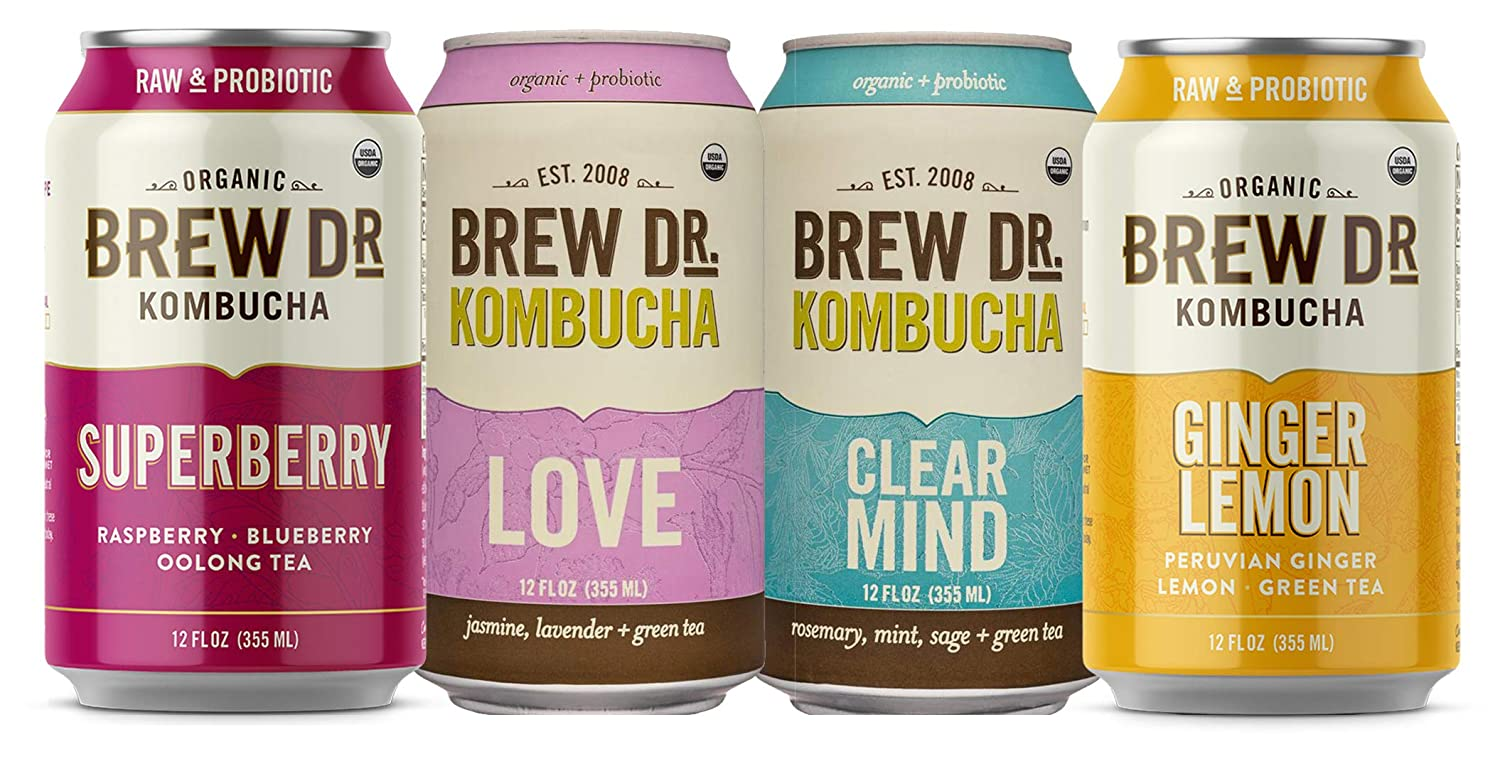
Brew Dr. Raw Organic Kombucha has a wide range of flavors, 12 grams of sugar per can, and all-natural flavoring. It’s a nice replacement if you’re used to sugary drinks, though the sugar content is high enough and its probiotic content is nonspecific enough that it lands further down in the rankings.
9. B-Tea Kombucha
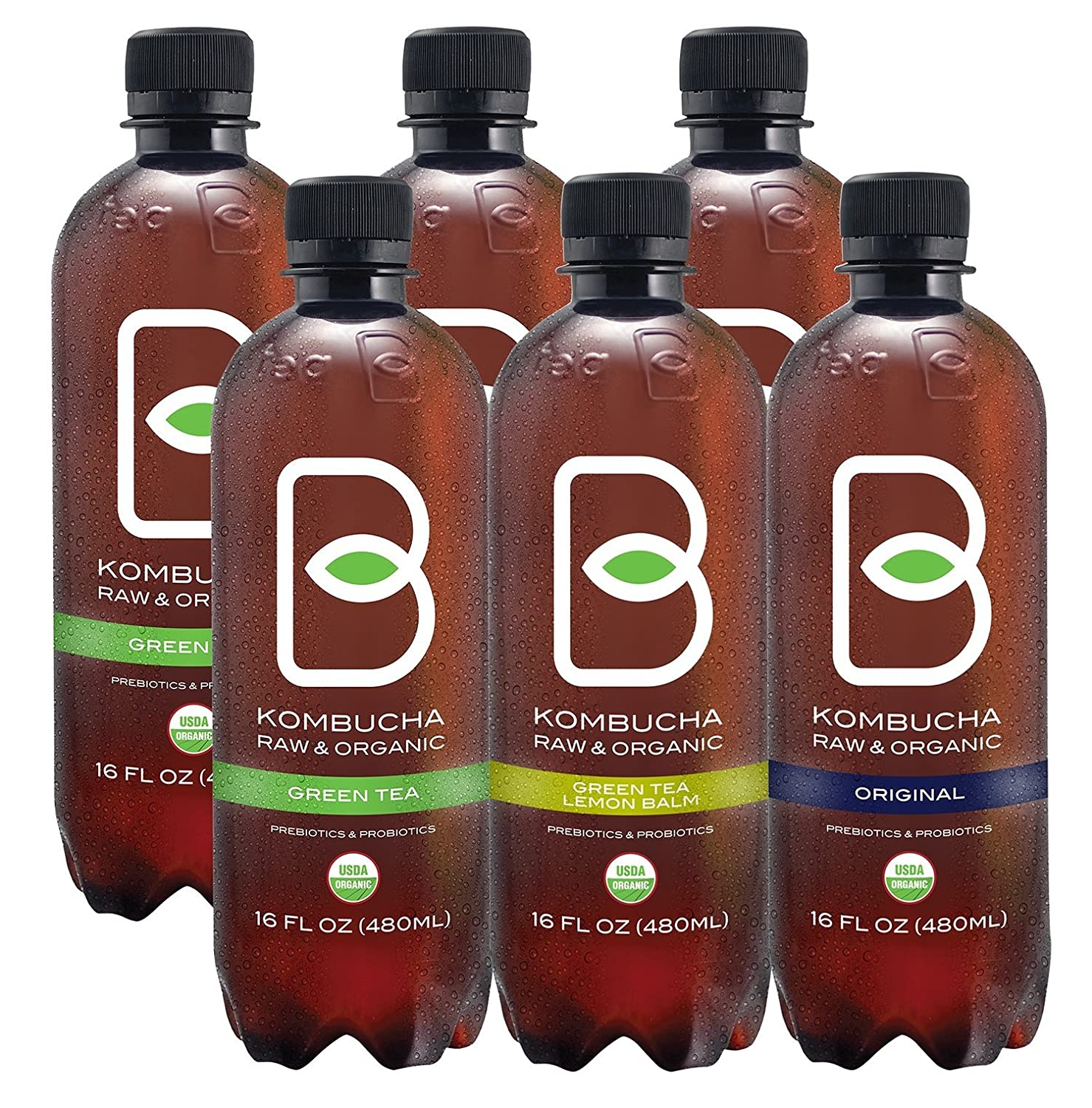
B-Tea Kombucha is a lot more heavily fermented than other kombuchas, which gives it a much sharper and almost alcoholic flavor.
This makes it a more divisive kombucha product, as not everybody appreciates the sharp, sour taste. It does mean that the sugar content is quite low, though, at 2 grams per bottle.
Still, if you are going to be drinking this for health benefits on a regular basis, taste is important, which results in B-Tea Kombucha ending up lower down in the rankings.
10. Koe Organic Kombucha
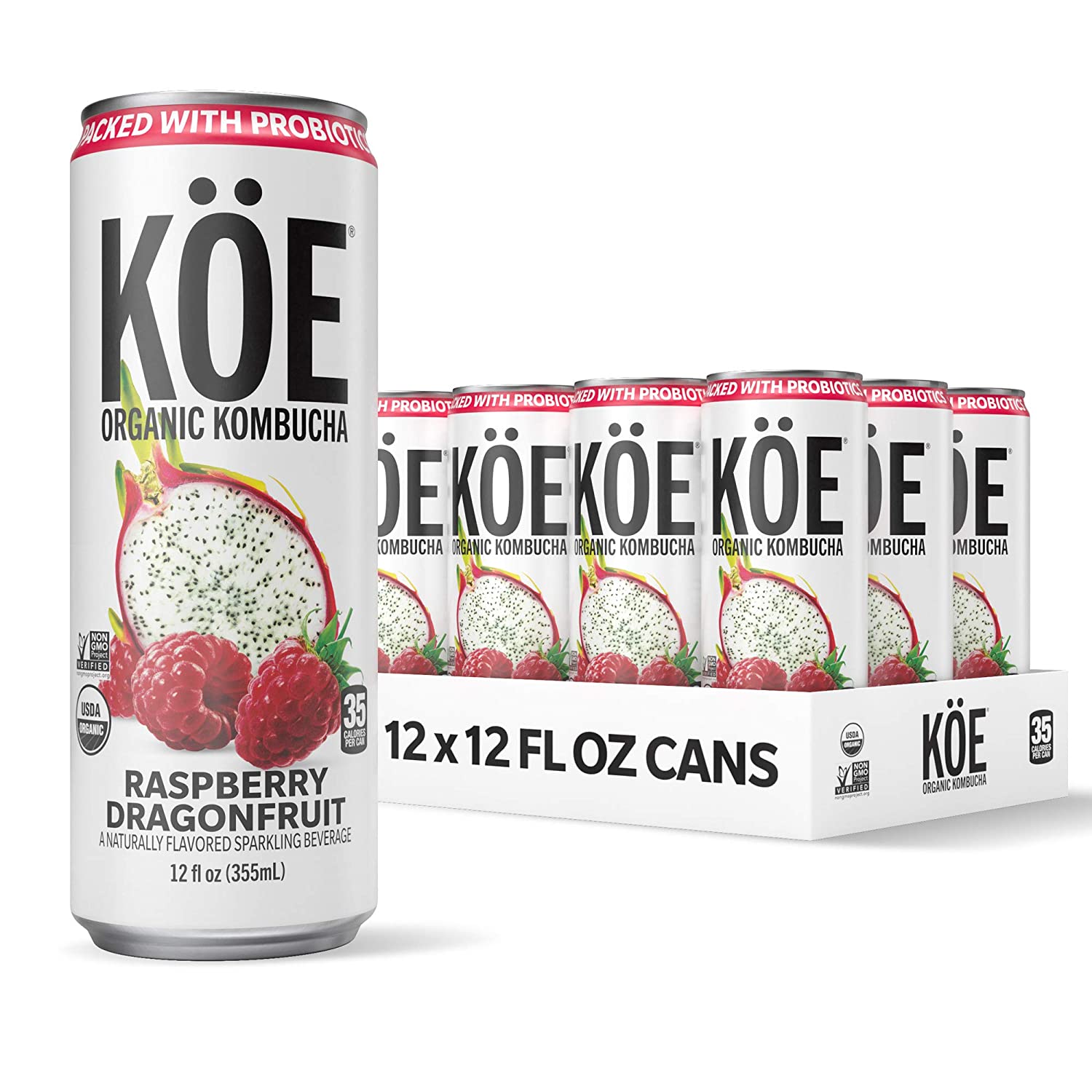
Koe Organic Kombucha is certified organic and has a refreshing taste, but its sugar content is prohibitively high for most people looking for a healthy drink.
At 20 grams of sugar per can, it’s more in line with what you’d get in a soda than a healthy probiotic beverage. While it’s okay as an occasional treat, the high sugar content makes it unsuitable for a daily kombucha drink.
Who should buy kombucha?
Kombucha is safe for most individuals and is a great choice for people looking to improve gut health and enhance weight loss. It can also help support the immune system and fight off colds.
Due to the high bacteria content, pregnant women and children should not consume kombucha. Certain kombucha brands can also contain a lot of sugar, which can be both unhealthy and dangerous – especially for diabetics. Until more studies are confirmed, only healthy adults should be consuming kombucha.
Category winners
Best kombucha overall: GT’s Organic Kombucha
GT’s is a long-time favorite among kombucha lovers thanks to its excellent taste, wide variety of flavors, lack of added sugar, and powerful combination of probiotic bacteria. Classic flavors boast only a handful of carbs per bottle, making it a great overall choice.
Best canned kombucha: Remedy Kombucha
On the go and have no interest in lugging around a glass bottle? Remedy is the perfect choice for you. It comes in a 12 oz can and has no added added sugar, making it the perfect portable probiotic boost. Plus, the wide variety of flavors mean you’ll never get tired of it.
Best kombucha with probiotics: GT’s Organic Kombucha
While all kombuchas have some level of probiotic bacteria, it’s hard for most brands to measure up to GT’s. Unlike much of the competition, GT’s actually lists both the bacterial strains and their CFU content—with their most popular formulations, you get two billion CFUs of two proven probiotic bacterial strains, plus prebiotics to aid their development inside your body.
Best kombucha for beginners: Humm Probiotic Kombucha
Not sure if you’re ready for the most aggressive, exotic kombucha drinks? No fear—Humm Probiotic Kombucha is a great kombucha that’s suitable for both beginners and experienced kombucha connoisseurs alike. It’s carbonated and has very few carbs, so if you love sparkling drinks like La Croix, you’ll love Humm too.
Best kombucha for weight loss: Remedy Kombucha
Kombucha’s benefits for weight loss mostly hinge on its ability to augment your body’s population of probiotic bacteria—hence our choice of Remedy Kombucha, with its high probiotic count and low sugar content. It boosts the levels of healthy bacteria in your gut without adding to your sugar intake, making it great for weight loss.
Best kombucha for gut health: GT’s Organic Kombucha
GT’s takes the crown for gut health thanks to its diverse range of probiotic bacteria, and their high concentration, across its wide-ranging flavors. Other kombucha brands might be quicker on the draw with new trends, like zero carb and carbonation, but GT’s probiotic bacteria content enable it to come out on top for gut health.
How we ranked
When looking at the various kombucha’s products on the list, we first looked at the sugar content. We preferred products like Latta Kombucha and GT’s Kombucha that contained less than 5g of sugar. Our last pick, Koe, provides a certified organic kombucha but contains an astronomical amount of sugar per can (up to 20g).
Taste was also important. B-Tea Kombucha contains a low amount of sugar, but users report a much more alcoholic flavor due to the extra fermentation. While a solid choice, the poor taste lands it near the bottom of our rankings. Captain Kombucha has been rated by users as one of the best tasting products on the market. It does, however, contain a high amount of sugar (12g per bottle), which is why it ranked 5th. Brew Dr. contains a little bit more sugar than we like but makes up for it with its excellent taste. It also provides complimentary ingredients such a cayenne pepper, to support weight loss and detoxification.
The kombucha delivery method was also important to consider. We preferred fermented beverages as those are what scientific studies have used. Kombucha Pro made our list for providing a slightly different delivery system: concentrated raw kombucha extract in a tincture. Unfortunately, we have no way of measuring its efficacy, which is why it ranked fairly low. Yogi also provided a different form of kombucha, in the form of powdered green tea. It is unclear whether or not the probiotics survive the drying process, so we chose to rank it in the middle of our pack.
Lastly, we looked at purity. GT’s Kombucha contained no fillers, minimal sugar, and still tasted great – which is why it took the top spot.
Benefits
Kombucha contains probiotic bacteria that can boost your immune system. One surprising area of research on the uses and benefits of kombucha is in agriculture, where scientists are searching for better alternatives than synthetic antibiotics for increasing the resistance of farm animals to infection.
Research from this field suggests that kombucha could boost immunity and reduce the risk of infections, according to an experiment described in the journal Comparative Clinical Pathology (1).
The experiment involved feeding a large group of chickens either a diet supplemented with kombucha extract, or a control diet.
The researchers found that the kombucha supplemented diet improved gastrointestinal health and increased immunity in the chickens in a manner similar to that of traditional antibiotics.
This led the researchers to conclude that kombucha likely increases the activity of the immune system, and their findings suggests that people could benefit from this immunity boost too.
Kombucha is a great alternative to dairy based probiotics. Many of the traditional sources of probiotic bacteria in the typical diet are dairy-based.
This includes cheese, butter, yogurt and cottage cheese. Unfortunately, if you are lactose intolerant, a lot of these options are off the table (unless you take a lactase supplement).
However, kombucha is one probiotic food that is not dairy-based, and as such, people who are lactose intolerant can choose it as a probiotic source that won’t cause more gastrointestinal problems than it solves.
This was the conclusion of Anil Panghal and other researchers at Lovely Professional University and the Indian Institute of Food Processing Technology in an article published in 2018 in the journal Food Bioscience (2).
Along with the other non-dairy probiotics like kefir and kimchi, kombucha delivers a high dose of probiotics and other nutrients thanks to its fermentation period.
The researchers highlight a range of health benefits associated with the probiotic bacteria in kombucha, ranging from lower cholesterol, better immunity, increased calcium absorption, better protein digestion, and improved synthesis of B vitamins like folic acid.
For the 70% of the world that’s lactose intolerant, kombucha offers a very attractive way to garner these benefits.
Kombucha offers many of the antioxidant benefits of green tea. One of the other potential benefits of kombucha that Panghal and colleagues highlighted in their review article is the polyphenols present in the green tea that’s used to produce kombucha.
These polyphenols remain in the final product, so kombucha may have many of the same health benefits associated with green tea.
These include weight loss, better cardiovascular health, and strong resistance against the effects of oxidative damage on the body. These benefits are mostly theoretical, though; there haven’t been many studies that have directly tested the antioxidant effects of kombucha in humans.
Some animal studies do support this proposition, however. One such study was published in the Journal of the Science of Food and Agriculture in 2008 (3).
This study used mice that were intentionally fed a diet that would create high cholesterol. Some of the mice were given a kombucha extract as part of their diet, while some of the mice were not.
The mice given kombucha experienced decreases in their cholesterol levels and increases in biomarkers associated with antioxidant activity, indicating that the kombucha helped them achieve a healthier biological state.
More research needs to be done to validate this finding in humans, but these initial findings are promising and suggest that the health benefits of kombucha extend beyond just the probiotic content.
Side effects
Some public health officials have expressed concerns over the health risks of kombucha, particularly because many people are choosing to manufacture and ferment it themselves.
A report from the Centers for Disease Control and Prevention described a series of serious illnesses, one of which was fatal, in an Iowa town in 1995 that was linked to kombucha consumption (4).
The CDC concluded that a series of errors in the home-brewing process was probably linked to the adverse effects: homebrewers often store their kombucha at room temperature, do not carefully sterilize their equipment, and may use kombucha starters from untrustworthy sources.
They also may store it in ceramic containers glazed with toxic chemicals, which can leach into the solution due to the acidic nature of kombucha.
Kombucha from trustworthy commercial sources are usually not subject to these problems, as commercial producers use sterilized equipment and are inspected by public health officials.
Kombucha, as it is a naturally fermented product, does contain some level of alcohol. The alcohol content depends on how long the kombucha was fermented, and since there are no standards on fermentation time, alcohol levels can vary considerably.
Federal law states that kombucha is supposed to contain, at most, 0.5% alcohol, but some products have been tested and found to have alcohol concentrations of almost 4% (5).
Even at this concentration, it would take quite a bit of kombucha to have an appreciable effect, unless you are particularly susceptible to alcohol—some medications, for example, have profound effects on alcohol metabolism, so drinking a lot of the wrong kombucha drink could have some adverse effects.
Recommended dose
So far, research on kombucha has largely been relegated to either observational studies or tests of kombucha extracts in animals.
Neither of these make it particularly easy to recommend specific doses, and given how new kombucha is as a health trend, randomized controlled trials haven’t come out yet that would establish effective doses. Right now, typical kombucha intake is anywhere from four to 16 ounces per day.
Another dosing consideration to keep in mind is sugar content. Though the top-ranked kombucha drinks are very low in sugar, some other products have moderate to high doses of sugar, so keep your eye on the sugar content if you decide to drink a lot of kombucha on a regular basis.
FAQ
What is kombucha? Kombucha is a fermented drink popular for its health benefits. It comes from both black and green tea leaves combined with a symbiotic colony of bacteria and yeast.
Due to fermentation, kombucha has an alcohol content of about 0.5% or less – though this value can be up to 3% depending on the manufacturer. Given its low percentage of alcohol, kombucha tea is not technically deemed an alcoholic beverage and isn’t strictly regulated by the Food and Drug Administration.
Should pregnant women drink kombucha? No, pregnant women and children should not consume kombucha due to the high bacteria content.
Where does kombucha come from? Not much is known about the true history of kombucha tea, but many believe that it originated well over 200 years ago. Kombucha tea is thought to have originated in either Manchuria, China, where it has been traditionally consumed, or in Russia.
Does kombucha tea detox the body? Kombucha tea has antioxidants and detoxification properties, which can be effective in the treatment of several conditions. The most important is its positive impact on the digestive system, particularly the boost in good bacteria. This can lead to greater consistency within the digestive system and the ability to treat gut disorders (6).
Does kombucha combat E. coli.? Kombucha has been shown to have antimicrobial characteristics that have been proven to treat conditions like E. coli (7).
It is also known to directly reduce infections and inflammation within the gut. Furthermore, kombucha can be effective in preventing and reducing the proliferation of cancer within the body.
Can you drink kombucha and drive? Yes, kombucha has very low levels of alcohol that shouldn’t impair your driving.
How much kombucha can you drink in a day? The suggested daily serving is 2-4 ounces to start. Once you’ve become accustomed to the tea, you can increase your number of daily servings up to three, maxing out at about 12 ounces per day.
Though you can safely consume about 12 ounces of kombucha per day and remain safe, there is a risk of increased caloric intake because kombucha may have up to 120 calories per bottle (mainly in the form of added sugar).
Can you drink kombucha every day? Yes, you can safely consume up to 3 servings of 4 ounces of kombucha each day. If you notice that you’re experiencing any negative GI side effects such as diarrhea, you should limit or eliminate kombucha from your diet.
How much alcohol is in kombucha? To avoid strict regulation by the FDA, kombucha products need to contain less than 0.5% alcohol per serving. Some products may contain up to 3% alcohol, though these products will be more heavily regulated.
Can you get drunk on kombucha? The only way to become intoxicated when drinking kombucha is to drink eight whole bottles of kombucha or more fairly quickly to feel any intoxicating effects. In general, it is very difficult to get even a little bit drunk off of kombucha products.
Can kombucha test positive for alcohol? Yes, you can test positive for alcohol after consuming kombucha, but it would take a lot of kombucha tea to lead to a positive result.
Can kombucha help you lose weight? Kombucha can help you lose weight indirectly. The probiotics in kombucha help boost gut health while also improving the consistency of your digestion.
Probiotics can also help improve metabolic function, which can result in weight loss. Weight loss may occur as a result of an increased amount of probiotics, which improve your metabolic function.
Can kombucha cause weight gain? If kombucha contains a lot of sugar and is consumed in excess, it may contribute to unintended weight gain – despite its powerful gut healing effects.
Is kombucha safe for kids? Though kombucha does have plenty of health benefits, it shouldn’t be given to children. Due to the lack of research, there’s no guarantee of how their bodies will react to the tea.
Additionally, there’s the lingering issue that kombucha has trace amounts of alcohol in every serving, which can be detrimental to the health of developing children. Until there are studies analyzing the effects that kombucha can have on developing children, you should refrain from allowing your children to drink it.
Can kombucha make you sick? Any of the negative side effects you may experience will be the result of consuming too much kombucha, and your body’s natural intolerance to the tea. The greatest concern is hyperactivity of the digestive system, specifically an upset stomach or diarrhea.
However, contaminated kombucha can also make you sick, causing negative side effects like nausea, vomiting, and stomach issues. It’s also possible that you may have an allergic reaction to kombucha. To prevent an allergic reaction, you should only consume a small amount of kombucha at first to see how your body reacts.
Does kombucha need to be refrigerated? Yes, kombucha needs to be refrigerated. If it is not, it will continue to ferment becoming very vinegary, and produce more CO2.
Why do people choose to consume kombucha? Kombucha is one of the few probiotic foods that you can drink as a beverage. People use it as a healthy alternative to soda, as kombucha is naturally fizzy and sweet, but doesn’t have the massive sugar content or acidity of sodas or sports drinks.
The fermentation process uses probiotic bacteria strains that have been associated with improvements in gut flora, making kombucha an increasingly popular choice for gastrointestinal health.
Is kombucha just a fad? Kombucha only recently made its way over to the United States, meaning it has yet to stand the test of time in America.
Additionally, there’s no real evidence that kombucha has any significant health benefits. Some positive effects have been studied, but the concept is relatively understudied at this point, and it would be inaccurate to say that there is incredible health potential. It wouldn’t be surprising if kombucha tea eventually made its way away from the limelight and became easily replaced by other “magic cure” (8).
Is kombucha dangerous? Kombucha is likely not dangerous, but there are certain things you should be aware of. There are plenty of reasons that kombucha could be considered dangerous. One of the most important things you have to consider is that this type of product does contain some alcohol, meaning there are potential dangers to children, women who are pregnant or breastfeeding, those that hold sensitive to alcohol or have certain allergies.
There is also the risk that the kombucha has been contaminated by outside factors, leading to side effects like jaundice, neck pain, vomiting, and stomach issues. Though these effects are short-term and very rare, they can be dangerous if they persist. It’s also important to note that people with compromised or weak immune systems should not drink kombucha tea due to its bacterial content.
Why is kombucha so expensive? Kombucha is expensive due to the extensive process (kombucha tea can take up to 14 days to make) and specific ingredients required to make it. High demand also affects the price of kombucha. With higher demand and lower supply, it’s completely reasonable that the price will skyrocket.
Where can I find kombucha tea? Kombucha tea is much more popular than it once was and is now available from plenty of retailers across the country. It’s most commonly found in health and wellness stores, but can also be found online.
Kombucha products will be found in either the tea or health sections of these stores, as the FDA is not required to regulate these products due to their incredibly low alcohol content. You can find kombucha in powdered versions as well.
Can you drink kombucha at night? Yes, it is safe to drink kombucha at night. However, it is not recommended since most kombucha contains trace amounts of caffeine which can cause restlessness and insomnia.
What’s the best type of kombucha to drink for health? The best kombucha to drink for health would be green tea kombucha due to its high antioxidant content. However, most kombucha teas can help boost health benefits as long as the sugar content is kept low.
Should kombucha be stored in plastic or glass? Ideally, kombucha is stored in glass rather than plastic because plastic particles can leech into the fermented beverage. Glass, on the other hand, won’t break down and mix into kombucha, keeping it pure.
Furthermore, kombucha is sensitive to light. Specifially, the probiotics can degrade if exposed to light over a long period of time. When bottled in dark glass bottles, the probiotics are protected from light oxidation, helping it to stay fresher longer.
Related articles
Recap
Kombucha is a great source of probiotic bacteria, especially for people who are lactose intolerant. These probiotic bacteria are associated with benefits ranging from better immune system function to improved protein digestion.
Moreover, the green tea content of kombucha gives it strong antioxidant properties that may help lower cholesterol and ward off oxidative damage. Dosing information is scarce due to a lack of clinical trials, but consumption of four to 16 ounces per day appears typical.
If you’re looking for a healthy and tasty way to increase your intake of probiotic bacteria and antioxidants, kombucha might be just what you need.
For BodyNutrition’s #1 recommended kombucha, click here.